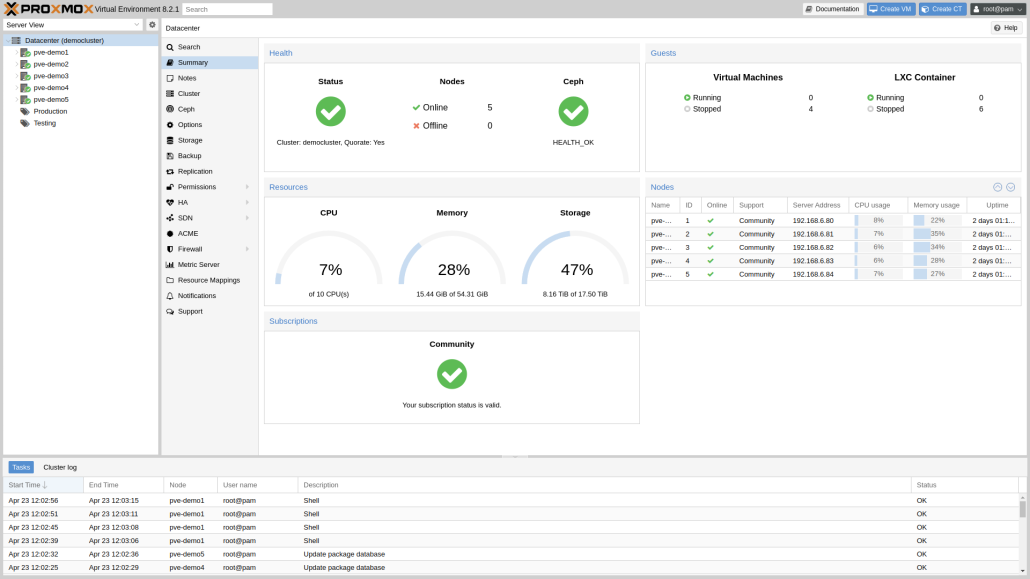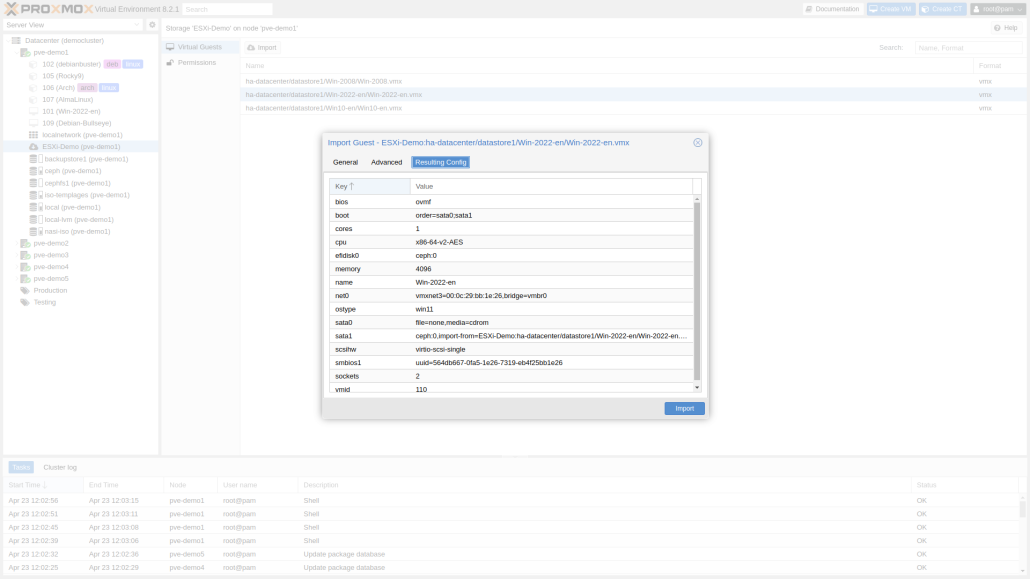Open Virtualization
Powered by Proxmox VE Virtualization Solution

Proxmox Virtual Environment: An All-in-One, Open-Source Platform for Enterprise Virtualization
Proxmox Virtual Environment (Proxmox VE) is a comprehensive open-source platform designed for enterprise-level server management and virtualization. It combines the power of the KVM hypervisor and Linux Containers (LXC) with software-defined storage and network capabilities on a unified platform. The intuitive, web-based interface allows you to effortlessly manage virtual machines, containers, high-availability clusters, and disaster recovery tools—all in one place.
A Unified Solution for Compute, Network, and Storage
With enterprise-grade features and a fully software-defined focus, Proxmox VE is ideal for virtualizing IT infrastructures, maximizing resource efficiency, and minimizing costs. Its robust platform supports even the most demanding Linux and Windows application workloads and enables seamless scalability of computing and storage resources as your needs evolve, preparing your data center for future growth.

Features
Server Virtualization
Proxmox Virtual Environment (Proxmox VE) is built on Debian GNU/Linux, using a custom Linux Kernel, with all source code freely accessible under the GNU Affero General Public License v3 (GNU AGPLv3). This license allows full freedom to use, inspect, and contribute to Proxmox VE, fostering an open-source ecosystem where users can download the ISO installer or explore the code directly in the public repository (git).
Open-source software ensures transparency, providing complete access to all features, reliability, and security. Proxmox welcomes contributions to Proxmox VE, while the Proxmox company maintains a high-quality, enterprise-grade standard for the platform.
Core Proxmox Technologies
- Kernel-based Virtual Machine (KVM)
KVM is a top-tier Linux virtualization technology that enables full virtualization with near-native performance on x86 hardware supporting Intel VT-x or AMD-V. Each virtual machine (VM) in KVM has its own virtualized hardware, making it ideal for running both Linux and Windows applications on a single system. This setup conserves energy, reduces costs, and supports agile, scalable, software-defined data centers. KVM has been a part of Proxmox VE since its initial release in 2008. - Container-based Virtualization with Linux Containers (LXC)
LXC provides a lightweight, container-based virtualization by sharing the host system’s kernel, allowing multiple isolated Linux systems to run on a single Linux host. As an operating-system-level virtualization tool, LXC is efficient for system or application containers, enabling straightforward management via an API and user-friendly tools.
With these advanced virtualization technologies, Proxmox VE provides the flexibility and performance to meet diverse business demands, building a scalable foundation for modern data centers.
Explore Proxmox technology further:
Central Management and Automation
To streamline the management of your virtual data center, Proxmox VE offers a centralized, web-based interface accessible from any modern browser. This interface is mirrored in the Command Line Interface (CLI) and REST API, enabling automation and integration with other systems.
Web-Based Management Interface
Proxmox VE’s intuitive, graphical user interface (GUI) makes managing tasks straightforward without the need for any additional management tools. Built on the ExtJS JavaScript framework, the web interface provides a comprehensive overview of task history, system logs, backup processes, live migrations, software-defined storage, and high-availability activities. The multi-master setup allows for cluster management from any node, eliminating the need for a dedicated manager node.
Proxmox VE on Mobile
Manage Proxmox VE remotely with the Android app or the HTML5-based mobile interface. The Android app, developed on the Flutter framework, provides full access to clusters, nodes, VMs, and containers. The HTML5 mobile client also supports SPICE and HTML5 consoles, offering on-the-go management of configurations and resources.
Command Line Interface (CLI)
Advanced users can manage Proxmox VE via a robust command line interface compatible with Unix shell and Windows Powershell. The CLI includes intelligent tab completion and comprehensive documentation through UNIX man pages, making it an efficient option for experienced administrators.
REST API
Proxmox VE’s REST API, using JSON as its data format and defined with JSON Schema, allows easy integration with third-party tools or custom hosting environments. This RESTful API enables seamless automation, extending Proxmox VE’s flexibility and efficiency for diverse virtual data center needs.
Clustering
While many users begin with a single node, Proxmox Virtual Environment (Proxmox VE) can scale seamlessly to a large cluster of nodes. The clustering stack is fully integrated and available by default, enabling effortless expansion as your needs grow.
Proxmox Cluster File System (pmxcfs)
Proxmox VE employs the exclusive Proxmox Cluster File System (pmxcfs), a database-driven file system developed specifically by Proxmox. This unique system allows for real-time synchronization of configuration files across all nodes within a cluster, utilizing Corosync for continuous replication. Configuration data is stored both in RAM and on disk, with a maximum size of 30 MB—ample space for managing thousands of VM configurations. Proxmox VE is the only virtualization platform offering this innovative cluster file system.
Live/Online Migration
The live/online migration feature in Proxmox VE allows administrators to seamlessly move running virtual machines from one cluster node to another with zero downtime and no impact on end-users. This feature, accessible through both the web interface and CLI, is invaluable for performing maintenance without interrupting services.
Unique Multi-Master Design
Proxmox VE’s multi-master architecture simplifies cluster management by enabling system-wide maintenance from any node. The intuitive, web-based interface provides a centralized view of all KVM guests, Linux containers, storage, and cluster resources across nodes. Proxmox VE requires no additional, costly management servers, offering a streamlined solution to manage extensive virtualization environments efficiently.
Role-Based Administration and Flexible Authentication
Role-Based Access Control
Proxmox VE offers a robust, role-based permission management system that allows for precise control over access to various objects, such as VMs, storage, and nodes. Through this system, administrators can define specific privileges to control access levels. Each permission combines a subject (such as a user group or API token) with a role (a predefined set of privileges) assigned to a specific path, providing a powerful way to secure resources within the environment.
Authentication Realms
Proxmox VE supports diverse authentication sources, enabling seamless integration into existing infrastructure. Authentication options include Linux PAM, the built-in Proxmox VE authentication server, LDAP, Microsoft Active Directory, and OpenID Connect. These flexible options allow Proxmox VE to adapt to various organizational needs, simplifying user management and enhancing security across virtual environments.
High Availability (HA) Clusters: Reliable Virtualization with Minimal Downtime
A multi-node Proxmox VE cluster provides the foundation for creating highly available virtual servers. Built on robust Linux HA technologies, the Proxmox VE HA Cluster ensures stability and reliability, with easy configuration through the integrated web-based interface.
Proxmox VE HA Manager
The Proxmox VE HA Manager is a built-in resource manager that monitors all virtual machines (VMs) and containers within the cluster. If a failure occurs, the HA Manager automatically initiates recovery actions, ensuring uninterrupted service. With zero configuration required, this tool operates out-of-the-box, while watchdog-based fencing further simplifies HA deployment.
Proxmox VE HA Simulator
Proxmox VE includes a High Availability Simulator, allowing users to test the functionality of a three-node cluster with six VMs. This simulator runs out-of-the-box, offering a practical environment for understanding and exploring Proxmox VE HA behavior in a real-world setup.
Scalable Networking for Any Business Need
Proxmox VE’s networking features offer adaptable, scalable solutions for responsive networks that grow with your business demands.
Software-Defined Networking (SDN)
Proxmox VE’s Software-Defined Networking (SDN) capabilities enable advanced, multitenant network configurations across Proxmox VE clusters. Use cases vary from isolated private networks on individual nodes to complex overlay networks spanning multiple locations. Proxmox VE SDN supports a range of network setups, from simple NAT routing to traditional 802.1q VLANs and advanced features like QinQ, VXLAN tunneling, and BGP-based EVPN infrastructures.
For more information on SDN in Proxmox VE, read here.
Linux Networking Stack
For simpler network setups, Proxmox VE offers flexible configurations for individual nodes using a bridged network model, enabling seamless connectivity between virtualized environments and external networks. Virtual network bridges, similar to physical switches, are implemented in software on the Proxmox VE host. Additional configurations include setting up VLANs, bonding interfaces, and basic routing to enhance network flexibility.
Explore more on Proxmox VE Network Configuration here.
Flexible Storage Options
Proxmox VE offers a highly flexible storage model, allowing VM images to be stored on local devices or shared storage solutions like NFS or SAN, with no limitations on the number of storage configurations. You can leverage any Debian-compatible storage technology, and shared storage enables live migration of running VMs with zero downtime.
Supported Storage Types in Proxmox VE Web Interface
- Network Storage Options:
- LVM Group (backed by iSCSI targets)
- iSCSI target
- NFS Share
- SMB/CIFS
- Ceph RBD
- Direct to iSCSI LUN
- GlusterFS
- CephFS
- Local Storage Options:
- LVM Group
- Directory (existing filesystem storage)
- ZFS
For more details on the Proxmox VE Storage Model, read here.
CEPH Integration
Ceph is a powerful, open-source distributed object store and file system built for high performance, reliability, and scalability. Proxmox VE seamlessly integrates Ceph, allowing you to manage and operate Ceph storage directly from any cluster node.
Ceph Storage Types in Proxmox VE
- RADOS Block Device (RBD): Offers block-level storage suitable for disk images and snapshots.
- CephFS: Provides a POSIX-compliant file system, leveraging the Ceph cluster to store its data.
Benefits of Using Ceph with Proxmox VE
- Simplified setup and management via the Proxmox VE GUI and CLI
- Self-healing capabilities for data integrity
- Scalability to exabyte levels
- Flexible pools with customizable performance and redundancy
- Economical – runs on cost-effective commodity hardware
For more information:
Proxmox VE Firewall: Robust Security for Your IT Infrastructure
The Proxmox VE Firewall is a powerful, customizable solution for protecting your infrastructure, with easy configuration through both the GUI and CLI. The firewall allows you to set rules for all hosts within a cluster or to apply rules specifically to virtual machines and containers. To simplify configuration, the firewall includes helpful tools like macros, security groups, IP sets, and aliases.
Distributed Firewall
The Proxmox VE Firewall is distributed across all cluster nodes, with configurations stored in the cluster file system and an iptables-based firewall running on each node. This design provides complete isolation between virtual machines and higher bandwidth than centralized firewall solutions.
Full IPv4 and IPv6 Support
The firewall supports both IPv4 and IPv6, filtering traffic for each by default. IPv6 support is seamless, eliminating the need to manage separate rules for different protocols.
For more details, read about the Proxmox VE Firewall.
Reliable Backups for Comprehensive Data Protection
Backups are essential for any IT environment, and Proxmox VE offers a fully integrated backup solution that leverages the capabilities of each storage type and guest system. Backups can be initiated easily through the GUI or via the vzdumptool in the command line, providing full backups that include VM and container configurations and all associated data.
Consistent Snapshots with vzdump
The integrated vzdump tool creates consistent snapshots of running containers and KVM guests by archiving all VM or container data, along with configuration files. This ensures a reliable, full backup every time.
Scheduled Backups
Proxmox VE supports automated, scheduled backup jobs, allowing you to specify days, times, nodes, and guest systems, ensuring regular, hands-free backups across your environment.
Flexible Backup Storage
KVM live backups work across various storage types, including NFS, iSCSI LUNs, and Ceph RBD. The Proxmox VE backup format is optimized for efficiency, with features like support for sparse files and minimized I/O, enabling quick and effective storage of VM backups.
For detailed instructions, read about configuring Proxmox VE Backup and Restore.
Enterprise-Class Backup Solution for Complete Data Protection
Proxmox Backup Server is a high-performance backup solution designed to securely back up virtual machines (VMs), containers, and even physical hosts. Fully integrated with Proxmox VE, it enables seamless backup and restore operations within the same intuitive interface used for other storage types.
Incremental Backups with Efficiency
Proxmox Backup Server supports incremental backups, transferring only changed data over the network. This approach optimizes network bandwidth and reduces backup run times. For added security, data can be encrypted on the client side, ensuring that backed-up data remains protected from unauthorized access.
Live-Restore for Minimal Downtime
To reduce downtime during large VM restores, Proxmox Backup Server offers a live-restore feature. This allows the VM to start immediately when the restore process begins, with data prioritized and transferred in the background based on real-time VM access.
Single-File Restore for Precision Recovery
For situations where only specific files or directories are needed, Proxmox VE’s interface enables secure, targeted file or directory restoration from any VM or container backup, streamlining recovery for individual files without a full restore.
For a comprehensive backup solution with minimal downtime and precise recovery, Proxmox Backup Server delivers enterprise-grade reliability and security.
Subscriptions
Choose the Best Plan for Your Business
Premium
All you’ll ever need
€1020/year & CPU Socket
Standard
Most Popular
€ 510/year & CPU Socket
Basic
For growing businesses
€340/year & CPU Socket
Community
Starting out
€ 110/year & CPU Socket
Access to Enterprise repository
Complete feature-set
Support via Customer Portal
Unlimited support tickets
Response time: 2 hours*
within a business day
Remote support (via SSH)
Offline subscription key activation
Access to Enterprise repository
Complete feature-set
Support via Customer Portal
10 support tickets/year
Response time: 4 hours*
within a business day
Remote support (via SSH)
Offline subscription key activation
Access to Enterprise repository
Complete feature-set
Support via Customer Portal
3 support tickets/year
Response time: 1 business day
Access to Enterprise repository
Complete feature-set
Community support
* Guaranteed first response time on critical support requests
All prices are net prices. VAT will be added, if applicable.
Our Services
Proxmox is a robust solution for building and managing private clouds. With its extensive feature set, active community support, and comprehensive documentation, it stands out as a top choice for virtualization.
Proxmox seamlessly integrates with tools like Prometheus for advanced monitoring, Kubernetes for streamlined application deployment, and Ansible for efficient task automation, offering the flexibility and performance demanded by modern IT environments.
At Seventh Signal, our deep expertise in Proxmox allows us to provide tailored support and guidance, ensuring your virtualization projects succeed with confidence and efficiency.
Infrastructure and Cluster Design
We help you deisgn the optimal Proxmox Infrastructure including Network, Storage and Server Setups, as well as Automation and Monitoring.
Setup, Configuration and Migration Services
We help you setup your Infrastructure. We also offer help in migrating from legacy systems like XEN or VMWare to Proxmox.
Hourly rate / “Time and Materials”
We offer fixed contracts as well as per hour “Ad Hoc” work agreements
Subscribe Now
Stay up to date with the latest news and updates from Seventh Signal CY Limited.
